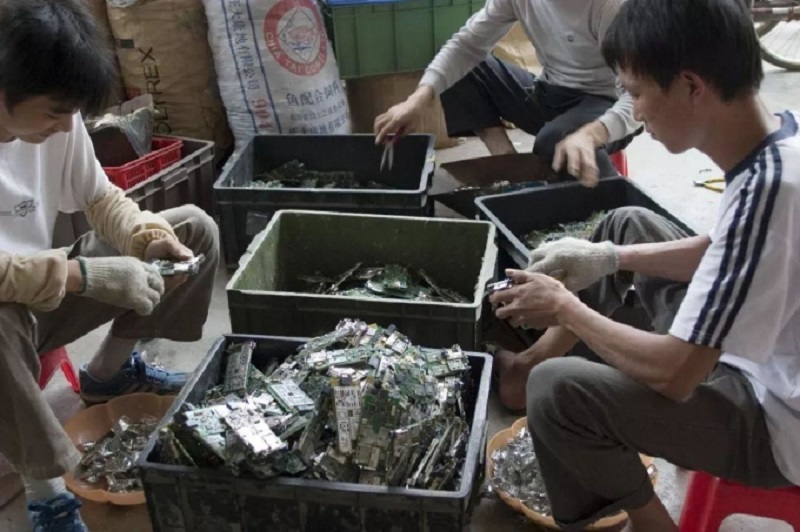The average circuit board of 10 million discarded phones contains 120 kg of gold.
The United Nations’ 2019 Global E-Waste Monitor report shows that 54 million tons of e-waste are generated around the world. That block of damaged electronics contained gold, platinum and precious metals worth at least $10 billion.

Workers at a factory that recycles electronic waste for gold in China.
According to Nikkei, Japan’s electronic waste is said to contain more gold than mineral mines in South Africa. Businesses in this country are looking to exploit it to produce Tokyo Olympics medals and many commercial purposes. The project of producing medals using electronic waste alone has helped Japan purify about 78,985 tons of small household appliances and 6.21 million old mobile phones. Through the refining process, recycling units have “unearthed” dozens of kilograms of pure gold, about 3,500 kg of silver and 2,200 kg of copper.
In China, recycling precious metals from electronic waste has become a money-making profession. Many private companies specialize in purchasing broken mobile phones to separate gold from the circuit board according to an elaborate process: Electrolysis, refining to get gold and copper. For every 10 million recycled mobile phones, 120 kg of gold and 84 tons of copper can be obtained, worth millions of dollars.
According to Sina, on average, about 50% of Chinese people change their phones within 15 months, and 20% of users upgrade their phones after a year. Every year, up to 400 million mobile devices are released into the market. However, only about 2% of this electronic waste is recycled.
In addition to mobile phones, electronic devices, such as CPUs, motherboards, memory chips, memory cards and other household appliances in computers also contain gold. However, waste collection and recycling in many countries is still a spontaneous activity, not following labor safety standards. Impurities and materials that do not bring much value such as mercury, lead, cadmium are still discharged directly into the environment without treatment.
The Guadian quoted Mijke Hertoghs at the United Nations International Telecommunications Union: “If collection and recycling are better organized, the economic scale will increase. This is also an opportunity to create a sustainable economy.” economy with new jobs. There will be a huge income for many people.”
However, Ms. Maria Neira at WHO, noted: “Improper recycling of electronic waste is a growing danger, silently affecting the health of workers as well as future generations.”


